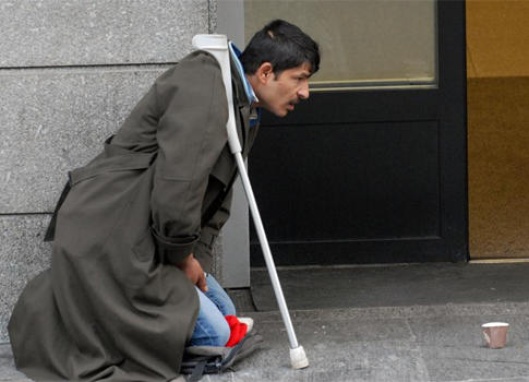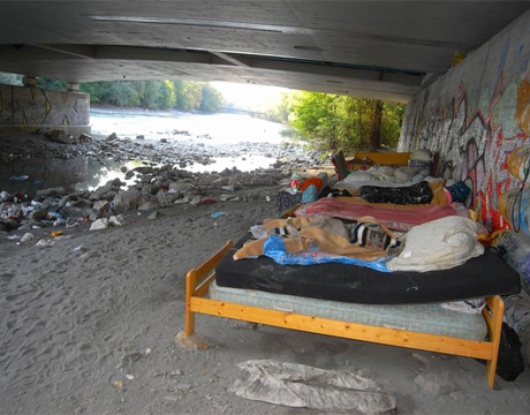Romanian Roma’s Swiss Eldorado: One Step Away from Closure
Published on
In a few months’ time, Geneva has become the new Romanian Roma Eldorado. Taking advantage of the new cantonal penal law of 27 January 2007 that legalises beggary, some 200 Roma – 77% of whom are Romanian – have hit the road and filled Geneva’s Chanel-flagranced streets.
 In the city of human rights, people beg on their knees. Live statues by the doors of shops and super-markets, waggling bodies at the bank and post office entrances, the beggars provide a repellent view. From musical instruments to crutches and silent babies, the Roma mendicants reach for every possible tool of mercy. Their misery cries out at every step, from the commercial area in the city centre to the secluded river banks.
In the city of human rights, people beg on their knees. Live statues by the doors of shops and super-markets, waggling bodies at the bank and post office entrances, the beggars provide a repellent view. From musical instruments to crutches and silent babies, the Roma mendicants reach for every possible tool of mercy. Their misery cries out at every step, from the commercial area in the city centre to the secluded river banks.
The picture went beyond troubling the local community and agitating the political class via the media: it resulted in a political plan aimed at discouraging the practice of beggary. Although this situation is far from being the first priority on the agenda, the outstretched hand poses ethical, social and public order problems that cannot be ignored. At the heart of the political wrestle is the new law on beggary that entered into force last January. Federal Councillor Laurent Moutinot’s initiative to abolish fines for acts of beggary brought about lively dispute among political rivals. The cherry on top of the cake was the decision to reimburse all the fines delivered from January on (in value of 100.000 francs ), under certain circumstances. Failing to anticipate the consequences of the law, the November wind saw Moutinot receding form his initial position, denouncing ‘the concerning evolution in the number of beggars’ in Geneva.
As a new type of tourism seemed to be unfolding, on 16 November, the police forces joined by social workers evacuated the Roma improvised shelters under the Arve river bridge and housed them in social protection centres. They are allowed to stay there for a maximum period of 10 days, after which the federal law on strangers will be enforced. This means that beggars found in illegal situations – ie, unable to justify that they have sufficient means to subsist – will be expulsed with no further notice. For the rest, the 90-day limit of tourist stay on Swiss territory will apply. Apparently, a travel aid will be provided by the authorities, under the form of bus tickets, as Isabelle Widmer, social service officer of the City of Geneva, stated for a local newspaper .
 The evacuation process was qualified by human rights defenders as ‘correct’ . The principal Roma rights defender on the affair, Doris Leuenberger, lawyer and president of the Mesemrom association for the protection of Roma in Geneva, denounced the purpose of the action as not solely aiming to produce a certain malaise for the mendicants, but as being a clear police control measure: ‘In ten days, we will be in the same situation as today, with the difference that the police have the identity of each person. They are recorded and will be no longer authorised to enter Switzerland’ .
The evacuation process was qualified by human rights defenders as ‘correct’ . The principal Roma rights defender on the affair, Doris Leuenberger, lawyer and president of the Mesemrom association for the protection of Roma in Geneva, denounced the purpose of the action as not solely aiming to produce a certain malaise for the mendicants, but as being a clear police control measure: ‘In ten days, we will be in the same situation as today, with the difference that the police have the identity of each person. They are recorded and will be no longer authorised to enter Switzerland’ .
The local media devoted extensive attention to the volatile newly-installed community of Calvin’s city. From newspaper interviews with the unwanted bank door keepers that hardly can speak any French, to heart-breaking pictures of unimaginable misery and feature reports televised at peak hours . The Roma figures tell the same story of pauperism, rejection and discrimination that forces them to find their way to the West. ‘There’s a war against the Roma everywhere; it was better in Switzerland, everybody knew this in Romania. If in their turn they harass us and send us away, where are we supposed to go? To the moon?’ , Daniel confesses to a newspaper.
Ironically enough, the Romanian ambassador to the United Nations, Mr Doru Costea, is the current UN Human Rights Council president. Torn apart between ‘a certain malaise, a form of embarrassment’ and ‘a certain responsibility’, His Excellency seems uncertain about who exactly should manage the situation that induces these sentiments. ‘We can very well consider the Roma issue as a European matter. … But if it is a European matter, it is obviously a Romanian affair. … The Roma community should pose itself the same questions. … At the same time, we are certain that a part of the problem will not be solved but in collaboration with other countries.’
However, the fact that the Roma mendicants in Geneva possess a Romanian passport should reassure the Romanian government that it is their problem before every one else’s. The upcoming negotiation on the extension of bilateral accords on the free movement of persons should also provide them with an incentive to look into this issue more attentively.
by Ioana, Credit Photo: interet-general



